AudioCulture
The noisy library of New Zealand music
Te pātaka korihi o ngā puoro o Aotearoa
Peter Jefferies
It’s July 28, 1994, and the Taranaki musician has gathered an attentive crowd for his support slot before Dimmer (for whom he also drums) in an Auckland University café. Entire Jefferies live projects have bypassed the Queen City since he left for Dunedin in the wake of This Kind of Punishment’s well-received performances at multi-media event The Nitpicker’s Picnic. But his recorded music is no less listened to for that.
The performing silence has been filled by a series of intriguing recordings and reissues, including three TKP albums, an EP and the Live ’85 tape. Add in ‘Randolph’s Going Home’ with Shayne Carter, 1987’s At Swim Two Birds with Jono Lonie and collaborations with The Rip’s Robbie Muir as a duo, and his part in Plagal Grind with Lonie, Muir, Galbraith, David Saunders and David Mitchell. His first solo record The Last Great Challenge In A Dull World followed in 1990. More recently, there was Electricity, a second well-received solo album. Peter Jefferies will touch nearly all those bases tonight.
Set opener ‘Fate Of The Human Carbine’ is one of his finest moments. A sombre stutter beat Xpressway Records single recorded in Plagal Grind downtime with Robbie Muir, it was reissued by US indie Ajax Records in 1991. Tonight’s live version lacks none of the record’s feel or grace.
‘On An Unknown Beach’, a standout track on the essential Xpressway Pile-Up compilation and The Last Great Challenge In A Dull World, draws a picture of a West Coast beach in winter so real you can see footprints fading in the wet sand. Slower and sparser than ‘Fate of The Human Carbine’, it shares its mood and gait.
“It always takes a while to get it right,” Jefferies says with a small self-deprecating laugh, before slipping into ‘Clear By Morning’ from Electricity, with its classical structure and movements. The song ends as it began, with Jefferies’ chatter. “I never quite know where that one’s going.”
There’s no such issue with ‘Electricity’ (the song), which barks defiant with the same dynamic as the steel-tipped Nocturnal Projections rockers of old, replacing hard, determined guitar with sharp, percussive piano. Jefferies’ stentorian voice being the constant. The mood swings radically with ‘Echoes’, which he introduces as “A new song, a tender wee thing, unreleased.” It later featured on Elevator Madness.
“This is a song by Barbara Manning. Has anyone heard of Barbara Manning?” he asks next, adding, “I love Barbara Manning.” ‘Scissors’ is a song that musically, Jefferies could have written.
He remains on similar turf with ‘Some More Than Others’, a sparse piano recital off the first This Kind Of Punishment album, following it with the majestic flipside, ‘Catapult’, from his 1989 single.
“Hi, how are you going out there? Are you getting sick of it yet? Are you ready for the band yet?” Jefferies sings songs with mock glee, a veiled reminder that his solo trajectory was relatively new, having spent the 1980s and early 1990s in a succession of bands.
Out front, the crowd is sparking with requests. “ ‘An Open Denial’,” someone yells hopefully. “An Open Denial? Ahhh … I’m sorry, I don’t know it,” Jefferies replies, despite the 1985 TKP album track being a feature on his mid-1993 American tour with Alastair Galbraith. A few more requests are dismissed the same way before someone suggests ‘Difficult Days’.
“Arr, well, ‘Difficult Days’ is on the set list so I can’t do that …” (small teasing pause) “… now for whoever asked for it … it’s ‘Difficult Days’. “A new interpretation of the gothic room filler from the second Nocturnal Projections EP, Another Year, which has been slowed right down with Jefferies’ deep-voiced words riding the swell and ebb of clean electric piano.
The set builds to a climax now with ‘Guided Tour Of A Well Known Street’ from The Last Great Challenge in a Dull World stomping straight through into The Dead C’s ‘Bad Politics Baby’, the Xpressway ‘Louie Louie’. There’s really nowhere left to go now except the stomping noise rock of ‘The Other Side Of Reason’, another standout track from the first solo album. Dimmer’s Shayne Carter and bass player Lou Allison join Peter onstage, making the song buzz like a hornet until halfway through, when they finally click and tear loose.
Jefferies’ involvement with Dimmer ends soon afterwards with only the trio’s nicely balanced 1995 single, the taunting misshapen ‘Crystalator’ backed with the soulful ‘Dawn’s Coming In’ as hard evidence on Seattle’s Sub Pop Records and on Flying Nun Records.
As busy as the drummer and singer had been, he was still just over halfway through the two productive decades during which he brought his drive and talent to bear. Much of the following eight years was spent in near constant motion through New Zealand, US, Canada and Europe as the records and live shows just kept coming.
Taranaki to Auckland
Peter Jefferies is a long way on from his Taranaki roots in Stratford at the foot of the province’s conical mountain, although its chill winds and rural silences will always inhabit his work. He was always musical. He played drums and piano and formed groups as a college student at Stratford High. The music fan in him soon located key influences John Cale, Syd Barrett and The Velvet Underground. White Light White Heat got ripped off the stereo so many times at parties he was surprised it was still playable, he recalled in the early 1990s.
In Auckland in 1979 with brother Graeme, he caught the Queen City’s second punk wave. Fired up by the experience, the Jefferies returned to New Plymouth in 1981 and formed Pink Noise, before co-opting the rhythm section of Electronically Tested, the city’s “only half decent band”. As Nocturnal Projections with Brett Jones (bass) and Gordon Rutherford (drums), the new post-punk quartet was soon performing in local halls before securing a residency at New Plymouth’s Lion Tavern in July 1981. The sound they made there spawned nearly 70 original songs, described by Jefferies as “Bass, drums, guitar, vocals, all full-on, all the time.”
“I had been drumming since I was 13, but when me and Graeme were writing songs one of us had to write the lyrics and sing them and that became me,” he told Danny Butt in an extensive interview in fanzine Sturgeon. The drum parts would be worked out with his brother and then taught to Gordon Rutherford.
Nocturnal Projections released two rough tapes then shifted base to Auckland in March 1982, where they played frequently and released three records.
Nocturnal Projections released two rough tapes then shifted base to Auckland in March 1982, where they played frequently and released three records – two EPs and a single – financed by the late Johnny Pierce (Children’s Hour, Headless Chickens). It’s a strong body of work quite unlike anything else being recorded in New Zealand at the time.
Peter Jefferies spent some time dismissing those days as he moved relentlessly forward, although he found some praise for second EP tracks ‘You’ll Never Know’, ‘Could It Be Increased?’ and ‘Difficult Days’. Railing against the over production of their second EP, Understanding Another Year In Darkness from 1983 – “We used 21 out of 24 tracks, we layered it, we overdubbed it” – he too easily dismisses some of his best early work, including the highpoint, ‘Understanding’.
Among that huge collection of originals lurked songs that the brothers would draw on for years to come. A reinterpreted ‘Difficult Days’ became the centrepiece of Peter Jefferies’ solo sets. A slowed down version of ‘Out Of My Hands’ featured on TKP’s Five By Four EP in 1985 and slower acoustic tracks such as ‘People Who Told Me’ and ‘No Problems Here’ appeared on Raffmond Records’ 1995 Nocturnal Projections compilation, Nerve Ends In Power Lines.
‘The Men By The Pool’, ‘Don’t Go’, ‘Words Fail Me’ and ‘Overground In China’ would soon form the basis of TKP songs while ‘Restoration’ was pencilled in for Nocturnal Projections’ third EP and survived into early TKP sets. A live version of the song taped at New Plymouth’s Bell Block in February 1983 was later released, as was a take on a pre-NPs song ‘Walk In A Straight Line’ from the same performance.
‘Moving Forward’ was yet another live track from February 1983. It was re-recorded by Graeme Jefferies’ The Cakekitchen for the Bald Old Bear CD EP in 1995.
Nocturnal Projections performed 130 times in their short life, touring New Zealand once in early 1983 after supporting New Order at Mainstreet in Auckland in early December 1982. On before poet John Cooper Clarke, the feisty New Plymouth quartet filled the Auckland venue with their formidable sound.
Having exhausted Nocturnal Projections possibilities for now, the Jefferies brothers rebelled against the experience by forming the initially sparse and experimental This Kind Of Punishment, setting up a reactive pattern that would define Peter Jefferies’ creative endeavour in the years to come.
“We were getting sick of playing in rock timing all the time – every song we’d written was in a broad sense the same – lots of lyrics and very little space. For a while it was like ‘are there any songs left to write?’ then I got a piano and Graeme got a violin. After that we did the next record with a 4-track, a 2-track and two microphones, not even a mixing desk,” Jefferies told Danny Butt in the early 1990s. Again in his rush to move on, Peter Jefferies has undersold himself. His lyrics are among the most distinct and unusual of the era. You’ll find words and ideas there that rarely feature in modern music, all ably disseminated by Jefferies’ clearly enunciated linear vocal.
The Jefferies brothers rebelled against the experience by forming the initially sparse and experimental This Kind Of Punishment.
The Jefferies brothers wrote, recorded and mixed the first TKP album in Auckland in July and September 1983 with soundman Andrew Frengley and Gordon Rutherford. They were flatting with Children’s Hour’s Chris Matthews and Johnny Pierce (a provincial punk drawn to Auckland from Whangarei, where he was in Stalag 13) at the time, which prompted Matthews’ contribution of the downbeat ‘Just Another Funeral’ to the album. The finished record was made available through Flying Nun Records in mid-1984 after a nine-month record company delay.
“By anyone else’s standards they would have been demos,” Peter Jefferies recalled, and they certainly have a pared back, skeletal feel about them. There’s also an ominous spooked sound and yet more fine lyrics on standout tracks’ ‘After The Fact’, ‘Just Another Funeral’, ‘Some More Than Others’, and ‘Ahead Of Their Time’.
With the pull of Auckland’s post-punk music scene weakening, the Jefferies returned to Stratford where they went straight into writing their second album, Beard Of Bees. Chris Matthews was by now a third member contributing vocals, guitar and drums and the sombre track, ‘The Sleepwalker’, later covered by Cat Power.
This Kind of Punishment recorded their second album in Stratford and Auckland lounges, bedrooms and halls in February, May, September and October 1984. The self financed and pressed Beard Of Bees was released in early 1985 and distributed by Flying Nun. This time TKP made a small profit. The album had a vaguely classical feel, Peter Jefferies recalls. “A lot of the piano songs were written at that point, including ‘Trepidation’, ‘Turning To Stone’, ‘An Open Denial’ and ‘The ‘Prelude’ and one non-piano one which was ‘(From The Diary of) Hermann Doubt’.
“We were steering more towards even more space in the songs, big gaps between the lyrics. The subject matter of the lyrics was becoming harder to define, more happening in my brain than happening in the world.”
This Kind of Punishment played only 14 live shows in their lifetime, a deliberate reaction to NP’s long live list, but most were telling and well remembered. In August 1984, they joined The Great Unwashed at Auckland’s Gluepot and Windsor Castle. This Kind of Punishment returned to The Gluepot with The Expendables for Campus Radio night on September 13. They were support act to Hunters and Collectors at the Galaxy, Auckland, in February 1985.
The May-Days tour with The Expendables took in Ashburton, Timaru, Christchurch (twice) and Dunedin in May 1985. Peter Jefferies compiled the best of the live tracks from the tour, including a stunning ‘From The Diary of Hermann Doubt’ for Live’85, an early Xpressway Records tape released in 1988.
Their final Auckland shows were as part of The Nitpicker’s Picnic, a two night multi-media event staged in Auckland University’s Maidment Theatre in July 1985. The two and a half hour showcase of music, film and dance put Emma Peel, David Clarkson, the Von Trans Sisters, the Salivation Army, Chris Knox and Te Kanikani O Te Rangitihi onstage, among others.
The 10-song TKP set drew on all their records with definitive versions of ‘After The Fact’ and ‘Two Minutes Drowning’ as high points. “There was a raw, exciting edge to TKP’s performance as it reached great heights of execution on both nights, especially with ‘After The Fact’, ‘Two Minutes Drowning’ and ‘The Sleepwalker,” RipItUp reported. TKP ended the show with “a manic barely controlled Sister Ray”. There were plans to release tapes of the show in the 1990s, but the record didn’t eventuate.
In August 1985, a new EP Five By Four was recorded by the touring TKP, which now included Johnny Pierce on bass. Reacting to the sparseness and gestation of the first two albums, Five By Four was “More spontaneous, in reaction to Beard of Bees’ long, slow methodical approach,” Peter Jefferies remembers. “It was done in a week, very rowdy and noisy and electric just to get away from classical things and acoustic instruments and piano.”
The EP features the aforementioned slower version of ‘Out Of My Hands’, inspired by Jefferies’ father’s mistaken playing of an NPs’ EP at the wrong speed. To emulate that sound, Graeme Jefferies was forced to find a mid key on his guitar where he could only play a few picked notes. “It sounds like a psalm to me,” Peter Jefferies said.
Five By Four was released quickly, in reaction to the group’s frustration with the slowness of their first album’s release. Peter Jefferies rang up Roger Shepherd at Flying Nun Records and told him, “If you release it in three months you can have it otherwise don’t expect anything from us again.”
By late 1985, he was restless and ready to move. During a three-month Satori in Dunedin with his girlfriend he met Bruce Russell and Shayne Carter, who would play a big part in his next creative phase. In Dunedin arts venue Chippendale House, he and Carter recorded ‘Randolph’s Going Home’, an emotional and spare tribute to the recently dead Wayne Elsey. It was enough to bring Jefferies back to the southern city in early 1986 with brother Graeme.
In The Same Room
The Dunedin the Jefferies brothers found in early 1986 was a small university city fast finding its feet as New Zealand’s most important indie centre of the mid-1980s to late 1990s. The year ahead would see Dunedin’s best resident groups The Verlaines, Look Blue Go Purple, The Puddle, The Orange and The Alpaca Brothers playing regularly at the Empire Tavern, student pub the Oriental and at arts venue Chippendale House, at 24 Stafford Street. Other key players such as David Kilgour and the three-piece Straitjacket Fits had yet to find the right mix for their next musical phase. The Chills and Sneaky Feelings were resident in Auckland by then, prior to heading overseas.
The city still lacked its own record label and was relying on the Christchurch based indie Flying Nun Records for exposure. Rational Records emerged later in 1986, but engaged with a separate section of the city’s music community. On the music media front, things were healthy with Richard Langston’s printed fanzine Garage hitting its stride, solid coverage in student newspaper Critic, and a responsive music section in mainstream newspaper Otago Daily Times. Radio One, the student station, was broadcasting the latest sounds and the vital black stuff could be found at two EMI chain stores and Roy Colbert’s Records Records store in the central city.
Peter Jefferies settled in Opoho in North East Dunedin and focused on the third This Kind of Punishment album.
Groups from New Zealand’s other indie scenes regularly made their way south as did stray musicians and fans. A trickle at first, followed by a deluge that would complement and influence the next era of music in the far southern centre.
Peter Jefferies settled in Opoho in North East Dunedin and focused on the third This Kind of Punishment album, to be called In The Same Room. Recorded partly in Dunedin, and finished in the Dominion building in Christchurch where Graeme Jefferies had moved, it was a return to older styles amid more recent sounds and inflections.
In early July, Dunedin fans heard at least some of those songs at Otago University after a new look This Kind of Punishment took the stage on a bill with visiting band Bird Nest Roys, Look Blue Go Purple and The Rip. The TKP line-up that night included Shayne Carter and Michael Morley (Wreck Small Speakers On Expensive Stereos), who provided the beguiling note-sprinkled lope ‘Holding’ to the group’s set. A re-recorded ‘Holding’ later used the live version as a guide track and would be a standout song on In The Same Room, when the album finally appeared in 1987.
The third TKP LP utilised the many moods of the Jefferies sound up to that point. ‘Ivan Fyodorvitch’ and ‘On Various Days’ were Beard Of Bees era songs that didn’t quite fit the earlier album, while ‘Immigration Song’ and ‘Left Turns Right’ were new compositions.
The end result was one of Flying Nun’s most complete albums so far and a fine summation. Jefferies was rightly proud of the record. “The ghost was laid to rest at that point.” It certainly didn’t deserve the offhand treatment and small pressing run it received from Flying Nun, an act that would anger Peter Jefferies for years to come.
In The Same Room signalled the end of the Jefferies brothers’ long musical collaboration. Graeme Jefferies would increasingly take a more melodic path solo then with The Cakekitchen while Peter Jefferies’ music remained introspective and confrontational.
Chain or Reaction
When Flying Nun Records moved into corporate mode in the late 1980s many of its more challenging acts, including Peter Jefferies and Alastair Galbraith, were rudely pushed from the tent.
That rejection was the fire that burned at the heart of their new Dunedin indie label Xpressway records. With Jefferies and Galbraith at its core alongside The Dead C’s Bruce Russell, who brought an appropriate PR savvy complete with an identity-nailing manifesto, a keen graphic design eye and networking skills to the party, the strongest creative collective in NZ since the early days of Flying Nun emerged.
Having the sublime ‘Randolph’s Going Home’ as a calling card in his new world helped as did a willingness to collaborate and immerse himself in new environments.
Peter Jefferies already had many of the recording skills the new label needed. Having the sublime ‘Randolph’s Going Home’ as a calling card in his new world helped as did a willingness to collaborate and immerse himself in new environments. From then on out it was work, hard relentless slog with compensatory outbreaks of creativity and cultural recognition for the “likeminded music community held together by a fairly serious, uncompromising mood.”
It would be easier to list the projects that Peter Jefferies wasn’t involved in from 1988 to the mid-1990s in Dunedin, he was that omnipresent in its fresh creative flowering. He’d already begun, as always, by reacting to what had just passed with At Swim Two Birds, a minor pastoral instrumental album with Jono Lonie.
The band guy in him found early expression in Alastair Galbraith’s Plagal Grind with Robbie Muir (bass), Jefferies (drums) and David Mitchell (guitar), who replaced Jono Lonie. Galbraith was thinking of heading to Australia when he first encountered the Jefferies brothers, who helped him record his second The Rip EP, Stormed Port, in 1987. Graeme Jefferies and Galbraith collaborated on a single, ‘Timebomb’, backed with ‘Bravely Bravely’, whose rejection by Flying Nun helped galvanised the emerging Dunedin collective to action in 1988.
The new label’s early releases were impressive. Peter Jefferies had a compilation of performances from TKP’s 1985 tour up his sleeve and Bruce Russell’s The Dead C had another live collection. Michael Morley and Richard Ram’s Wreck Small Speakers on Expensive Stereos had long been releasing tapes when A Child’s Guide to… was assembled. Alastair Galbraith’s Hurry On Down came in two versions with his Regent Theatre recordings at the core of both. Peter Gutteridge, who’d been a member of The Puddle, and was in the early stages of finalising the Snapper line-up, had enough recorded songs for his own omnibus tape, Pure.
International recognition wasn’t long in coming. Alastair Galbraith took those tapes and the showcase Xpressway Pile-up compilation of “recent works and archive treats” on a 1989 trip to Edinburgh. In Dunedin’s kin city, he played them to Avalanche Records, who agreed to release an amended version that added Peter Jefferies, Wreck Small Speakers On Expensive Stereos, ‘Randolph’s Going Home’, Victor Dimisich Band, The 3Ds and Snapper to the best of the original tape. The record that resulted would be one of the most important releases of the era and every group showcased would have multiple new releases in the future or their previous work reissued.
It was Peter Jefferies who ended up doing a lot of the “Xpressway donkey work”, mastering and sequencing tapes and engineering and recording new releases. All of the key tapes and the label’s vinyl singles were engineered and recorded by Jefferies, sometimes in collaboration. The Dead C’s The Sun Stabbed EP from December 1988. The Terminals’ ‘The Deadly Tango’ and ‘Do The Void’ single from November 1990. Jefferies and Robbie Muir’s ‘Catapult’ backed with ‘Fate Of The Human Carbine’ (the spiritual successor to ‘Randolph’s Going Home’), and Plagal Grind’s own dedicated seven song 12” EP, which appeared in November 1990 after two years’ gestation.
Jefferies was the drummer with Plagal Grind throughout their two-year, 20-show life. He also put the beat behind Kathy Bull and Bruce Blucher’s Cyclops after replacing Alan Armstrong. Cyclops were regulars around the southern city live traps and released two singles, including the warped rocker ‘Simpleton’ on Chicago label, ‘Feel Good All Over’ in 1991 and a 1993 album, Goat Volume. Jefferies also drummed on ‘Rain’ on Snapper’s 1990 debut LP for Avalanche Records, Shotgun Blossom.
The Last Great Challenge in a Dull World
Being a cog in a machine, even one as exciting as Xpressway, wasn’t enough for Peter Jefferies, who began recording his first solo album in 1989.
Being a cog in a machine, even one as exciting as Xpressway, wasn’t enough for Peter Jefferies, who began recording his first solo album in 1989. He had four songs already written when he borrowed a 4-track and disappeared into the Grey Street, Port Chalmers house he shared with Bruce Russell and artist Jane Davidson. Utilising what would be the core pool of Xpressway talent, Jefferies tapped David Mitchell, The Dead C, Kathy Bull and Alastair Galbraith to contribute. Five weeks later he had The Last Great Challenge In A Dull World completed.
Released initially as a tape on Xpressway, it is a diverse collection, veering from the sombre ‘On An Unknown Beach’, through the experimental ‘Domestica’, which uses kitchen utensils as instruments, to the stomping, squalling ‘Guided Tour of a Well Known Street’ and ‘The Other Side of Reason’.
“That break in the middle,” Jefferies would say of the last track. “It almost walks out of the speaker and tries to swallow you whole.” A vinyl release on US indie Ajax Records followed in 1991 establishing a foothold for Jefferies in an expanding US market.
Much of the most vital New Zealand indie music of the 1990s was released on small American and European labels, either through licensing deals with Dunedin-based Xpressway or from the groups themselves. All of a sudden you had cult figures such as Roy Montgomery, The Dead C, Bruce Blucher (Cyclops/ Trash) and Alastair Galbraith available on record again. And not just on one isolated EP or single. They would have multiple releases, which allowed their artistic vision space to develop more fully. The results were often thrilling although some acts overstretched themselves creatively. Better that than the slow grey death that Flying Nun had offered up then withdrawn.
As the floodgates opened, Peter Jefferies’ workload increased. He selected, recorded and mastered a three EP collection in October 1991 for the Xpressway influenced Belgian label Turbulence Records, called Killing Capitalism With Kindness. Drawing on a wide selection of Dunedin based musicians, the compilation sometimes falls short on quality, but is an impressive summation none the less. While he was at it, Jefferies recorded and played drums on Sandra Bell’s Dreams of Falling between October 1990 and November 1991. He then licensed the record to Turbulence for release in Europe.
With overseas labels willing and able to take on the pressing and release of New Zealand’s more challenging indie groups, Xpressway left them to it and retired. Throughout the 1990s, indie imprints including Ajax Records, Siltbreeze Records, New World of Sound, Hecuba Records, Roofbolt Records and Drag City would be a common sight in more adventurous NZ record collections.
Guided Tour of a Well Known Street
The Dunedin in-crowd got an early view of the solo Peter Jefferies at a spontaneous gathering at the Wren Building in 1990 that featured Alastair Galbraith & Graeme Jefferies, Plagal Grind, The Cakekitchen, Cyclops and a reformed TKP. Jefferies contributed a John Cale like version of ‘Heartbreak Hotel’ and the first live reading of ‘On An Unknown Beach’ before joining Plagal Grind for ‘Screaming E’, ‘Marquesite Lace’, ‘Cranes’ and ‘Starless Road.’
Just how busy Peter Jefferies was is apparent on X Way Vision, an Xpressway live video compilation that shows him drumming live on Cyclops’ ‘Steel White Bed’, Plagal Grind’s ‘Screaming E’, and Jefferies, Carter & Bull’s cover of the Doublehappys’ ‘Big Fat Elvis’. It also features the first sighting of his solo take on Nocturnal Projections’ ‘Difficult Days’.
With Shayne Carter and Kathy Bull, Jefferies released a live take on ‘Guided Tour of…’ recorded in 1991 at Sammy’s in Dunedin through new German indie Raffmond Records as part of What’s That Noise: Another Xpressway Compilation (1992). He also compiled (with Bruce Russell) and personally mastered the definitive Making Losers Happy: An Xpressway Compilation for Chicago’s Drag City Records.
New World of Sound from New Jersey had Jefferies engineer Trash’s ‘On and On With Lou Reed’ backed with ‘A Short Poem With The Voice of William Burroughs in Mind’ (for which he provided backing sound), released in 1992. A second collaboration that year with the Wellington-based Robbie Muir, Swerve, resulting in a double single on Ajax Records in 1992, failed to better their first record, even with Jefferies in fine voice, contributing piano, drums and digital cello.
Shayne Carter and Peter Jefferies had another crack at a Flying Nun single in 1992.
Shayne Carter and Peter Jefferies had another crack at a Flying Nun single in 1992. Needing songs for prospective live shows, the two friends came up with ‘Knocked Out Or Thereabouts’ and ‘Spark Off A Wire’ in 24 hours. “Knocked Out (or Thereabouts)’ is us being 19 year old punks, it’s a rough, rowdy bit of fun,” Jefferies reflected at the time, “but ‘Randolph …’ was lifting a weight that’s almost too heavy for anyone to bear.”
On July 26, 1992, KTV filmed a multi-group concert at Sammy’s featuring the southern city’s best, including The Bats, The 3Ds, Peter Jefferies and The Puddle. Excerpts of the show later appeared on TVFM.
1993 brought more of the same. Ajax Records released Jefferies and Stephen Kilroy’s ‘Wined Up’ and ‘Crossover.’ Cyclops had ‘Light’/ ‘Spolcyc’ on New World of Sound Records with Peter Jefferies providing drums, keyboards and engineering. When Sonic Youth returned for their first full NZ tour, he joined The Dead C as supports at Theatre Royal in Christchurch on February 12, 1993.
Turbulence Records picked up Chris Heazlewood and Celia Mancini’s King Loser for release in 1993. Their debut album Super Sonic Free Hi Fi featured five Peter Jefferies-engineered songs, on which he also drummed.
With the American market opening up and New Zealand’s indie rep higher than ever, Jefferies and Alastair Galbraith set out for the USA in mid-August, 1993. Filmed by Jeff Economy as a short documentary, Head In The Clouds, the tour concluded on September 6.
Electricity
A second Peter Jefferies solo album, Electricity, followed in 1994, released on Raffmond Records in Europe and Ajax Records in the USA. Recorded with Brendan Hoffman in Dunedin between May 1992 and February 1994, Electricity featured many of Jefferies’ previous collaborators. Shayne Carter provides guitar and bass on ‘Electricity’ and guitar on ‘Wined Up’. Bruce Russell does likewise on ‘Just Nothing’. Trash’s Paul Cahill and Plagal Grind’s Robbie Muir are the guitarists on ‘Crossover’ and ‘Snare’ respectively. There’s also a cover of US singer Barbara Manning’s ‘Scissors’, a menacing piece of subdued self-hate that Jefferies nails perfectly. A strong and aggressive album resulted. Jefferies, a big Leonard Cohen fan, had been in a “ratty mood” for Electricity and “it often shows.”
He promoted his new record on a short European club and festival tour with Sebadoh and Alastair Galbraith in April and May 1994. At the Fast Forward Festival in Nijmagen in Holland on April 19, Jefferies met Mecca Normal’s Jean Smith, with whom he would be romantically and creatively involved until the late 1990s. The Canadian duo of which she was half further utilised Peter’s piano skills in early May in Augsburg, Bavaria, on ‘Vacant Night Sky’ and ‘Cyclone’. The songs appeared the following year on Mecca Normal’s Matador Records album Sitting On Snaps.
Back in Dunedin in July 1994, there were two nights at Dunedin’s Empire Tavern with Bill Direen before heading north with Dimmer via Palmerston North for his first Auckland shows since 1985. Later that year Jefferies was joined by Mecca Normal and Trash for US West Coast and north-eastern shows. A March 1995 tour through New Zealand’s provincial centres followed with Mecca Normal and Michael Morley’s Gate, the John Cale-like Jefferies baring his baritone over hard, percussive piano.
With Jean Smith now living in New Zealand, a musical collaboration involving Michael Morley and Peter Jefferies resulted. The new trio, called 2 Foot Flame, recorded a debut album on a 4-track in Dunedin, which was released on Matador Records in October 1995.
Chorus of Interludes
That set the pattern for the next four years. Looking back with NZ Listener’s Philip Matthews in May 1998, Jefferies sketched out “an itinerant life between Austin, Texas, home of his record label Emperor Jones, Vancouver on Canada’s West Coast and Stratford in Taranaki.”
Much of his back catalogue had been reissued by then: TKP’s Five By Four EP and In The Same Room LP on Ajax Records in 1993. TKP’s Beard of Bees was made available on the same label the same year after an earlier revisit by Xpressway. A Nocturnal Projections collection with unreleased songs, Nerve Ends In Power Lines, arrived on Raffmond Records in 1995. A Chorus of Interludes brought together odd singles and album tracks for Ajax Records in 1996. Auckland reissue labels Pussy Muncher and Raw Power Records fished around on Nocturnal Projections early tapes, adding ‘Marlene’s Fish Shop’ and ‘My Neighbours’ to Hate Your Neighbours, a NZ punk bootleg in 1997, and four more tracks to the Worldview EP in 1998. At Swim Two Birds returned in 1997 on Drunken Fish Records as did This Kind of Punishment on Roof Bolt Records.
Jefferies produced a third solo album, Elevator Madness, recorded between January and June 1996 at Sounds Fine To Me and Profile Studios in Vancouver for the Emperor Jones label. In 1997, he was back in New Zealand for university Orientation dates with David Kilgour, Graeme Downes and The Magick Heads.
Jefferies and Jean Smith had moved to her home town Vancouver by then and booked a US tour for 2 Foot Flame alongside Peter Jefferies (solo) and Gate. They took time out to tape most of their second album, Ultra Drowning (1997) with Peter drumming, at Larry Crane’s Laundry Rules in Portland, Oregon, before completing the LP at tour’s end in Vancouver.
Remarkably, most of Peter Jefferies’ late 1990s overseas activity went un-noted in New Zealand.
With Jefferies drumming in Mecca Normal, 2 Foot Flame using Mecca Normal’s David Lester to replace Michael Morley, and Jefferies solo, they played 37 shows in the USA in 1997. Remarkably, most of Peter Jefferies’ late 1990s overseas activity went un-noted in New Zealand. Luckily, Jean Smith’s website caught it all. There was yet another 2 Foot Flame USA outing with Smith playing guitar and singing and Jefferies on drums and piano. A live-to-air set from the tour was captured for posterity, but not for release, on WFMU’s Stork Club.
Peter Jefferies’ contribution to Mecca Normal projects in the mid-1990s is extensive. He’s the drummer on their 1995 Matador Records’ single ‘The Bird That Wouldn’t Fly.’ He provides drums and piano in 1996 for their LP The Eagle & The Poodle, and MN’s ‘Paris in April’ single for K Records. 1997’s Who Shot Elvis? was also produced by Jefferies, a role he fulfilled on previous MN recordings.
Jefferies and Smith were back to New Zealand in February 1998 for a national 2 Foot Flame and Jefferies solo tour, which took in Auckland and New Plymouth’s Govett-Brewster Gallery and ran through to March. Canterbury University, Wellington’s Bar Bodega, State Of It in Napier and Palmerston North’s Wild Horse Saloon were visited with Lovely Midget and Tall Dwarfs among the tour’s support acts. A third 2 Foot Flame album was recorded at Killer Moa Studios in Inglewood, Taranaki, but remains unreleased. Substatic, an instrumental only LP with Michael Hill and Anita Anker, was recorded at the same studio and released in 1998.
By now, he was playing piano, drums and singing all at once. It started in America. A veritable post-punk one-man band. “One foot on the drum pedal, the other on a keyboard pedal; one hand on the keyboard, the other holding a drumstick,” is how Philip Matthews describes him in NZ Listener, adding, “besides creating an incredible sonic cohesion, it can almost be seen as a fundamental symbol; maybe of the image of one man against the world that you sometimes get from his records, of the versatility of his talent, certainly, but also of his admirable levels of commitment and dedication.”
Jefferies was bringing together the many skills that had previously been scattered through his own and others’ records and live shows – a personal centring after years of community dispersal. “The key is to see (the multi instrument set-up) as a whole like a drum kit,” he told Matthews, after early live experiences had left him with headaches.
It was a solo Jefferies in more ways than one who stepped out for a national tour in May 1998 with Shayne Carter, following the breakdown of his relationship with Jean Smith. His one-man band is riveting, neither gimmick nor musical overload, more a natural extension of the artist. And while the show at Luna in Auckland that month was packed, precious few saw him the following year at Sweetwaters’ January 1999 reprise in Auckland’s southern reaches. Under the high summer sun with new musical partner Anita Anker, they looked like John Cale beside Nico at their electric pianos. Time for one last single, ‘Ghostwriter’ b/w ‘Westgate Exit’, recorded in Melbourne with Australian Chris Smith in October 1998 and released on Australian indie Death Valley Records in 1999.
There was a run of Jefferies-related one-offs in the late 1990s. He guested on Dunedin’s Swarm’s IMD LP in 1995 and Cat Power took ‘Fate Of The Human Carbine’ for her 1996 EP, What Would The Community Think?. His interpretation of Spacemen 3’s ‘Come Down Easy’ and his own ‘Elevator Madness’ was taped for a Radio Massey live to air on September 4, 1997 and appeared as a single in 1998.
Closed Circuit
Indie fatigue had well and truly kicked in in New Zealand by the time Closed Circuit was released on Texas indie label Emperor Jones in 2001 and the album slipped quietly by.
Fans invariably opt for the first Peter Jefferies album as his best of the long form and until a few years ago, I’d have joined them in that.
Fans invariably opt for the first Peter Jefferies album as his best of the long form and until a few years ago, I’d have joined them in that. Back before a kind soul liberated his farewell 2001 CD from small run obscurity and popped it online. The effect of hearing the record and the sense of relief it brought was almost narcotic. As with In The Same Room in 1987, it brought together the sounds and experiences of Jefferies’ previous creative cycle and provided a summation and a conclusion.
It’s a winter album and things get a little crazy in winter, but it is also a time of deep clarity, where Jefferies’ brotherly advice finds appropriate light.
Closed Circuit starts with a tart bit of observation about a scene character on ‘Time and The Singular Man’, full of Jefferies’ anger and experience, a rant almost, and a cry of frustration. There’s more of that in the songs that follow, including the strident ‘Talkin’ About Nuthin’. More surprising are the almost optimistic, poppy tunes therein. When Jefferies loosens his wrists on ‘Red Sky’ and finds the music box dancer in ‘Ghostwriter’, a guarded optimism appears, and suddenly it’s ‘Won’t Be Long’ and spring breaking through. Having helped us through the turmoil of the 1980s and 1990s in New Zealand, Jefferies is now pointing the way forward. I realise now he must have played much of Closed Circuit at his last Kings Arms show in May 2002.
Home Again
Peter Jefferies lives in New Plymouth, New Zealand, where he is employed as a music teacher and mentor in Taranaki high schools. He is a part of the New Zealand Music Commission’s Music Mentoring In Schools Program.
The Taranaki musician has only played out once since August 2002, with Amanda Palmer at the Kings Arms in Auckland in September 2013, performing ‘On An Unknown Beach’ as a duo, and four of his songs solo. It was four months after the reissue of his debut album, The Last Great Challenge in A Dull World on De Stijl Records.
While he isn’t as lost as Palmer’s romantic revisiting suggests, wider New Zealand sees and hears very little of Jefferies these days. But in recent times several photos have appeared online. In the first, he is standing beside Ima Hitt’s Brian Wafer with a pile of records under his arm in New Plymouth record shop, Vinyl Countdown. In the second picture, he is at the shop’s counter signing Nocturnal Projections’ Worldview EP for Sticky Filth’s Craig
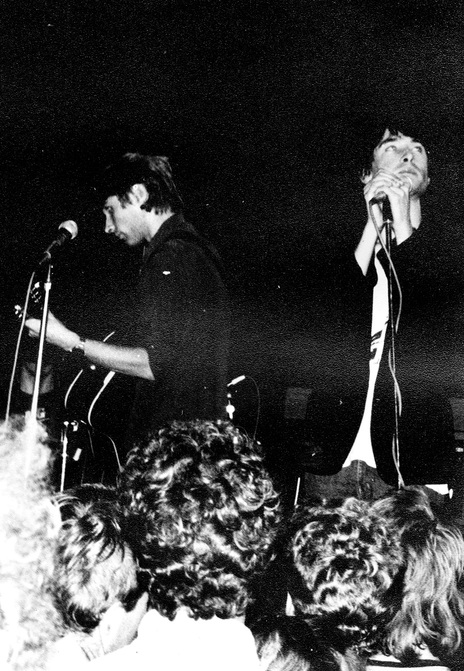
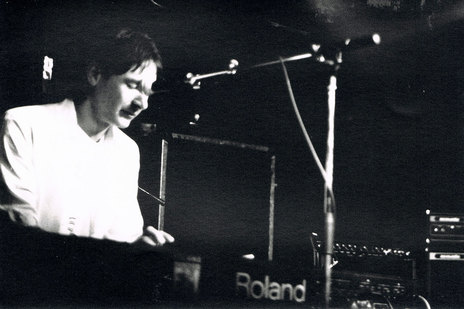
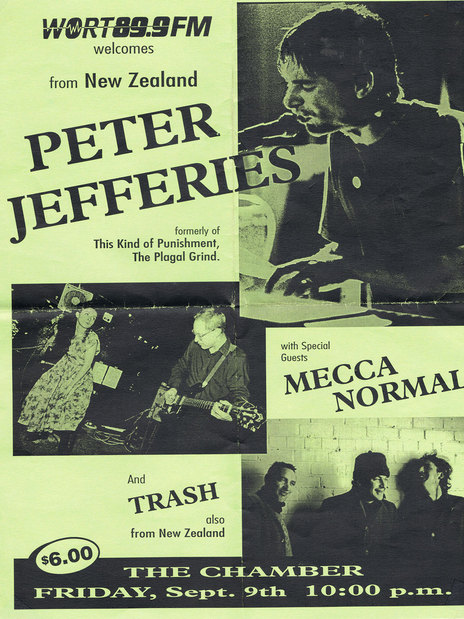
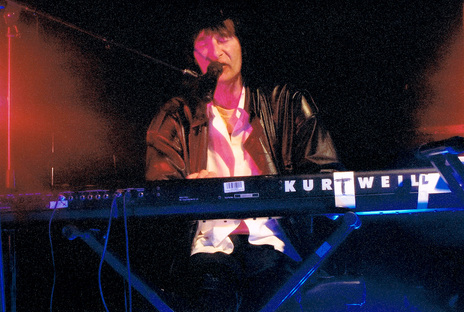
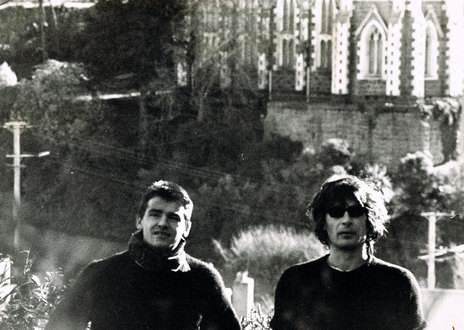
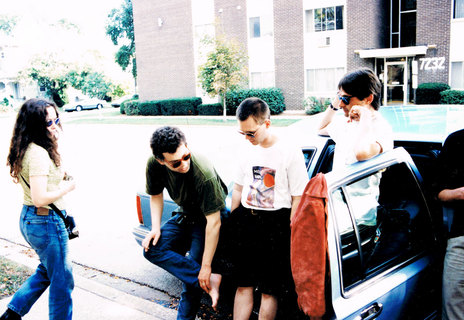
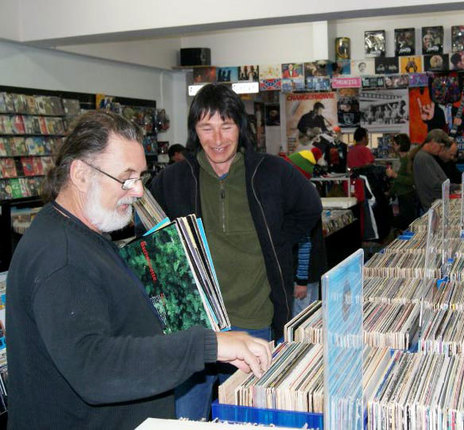
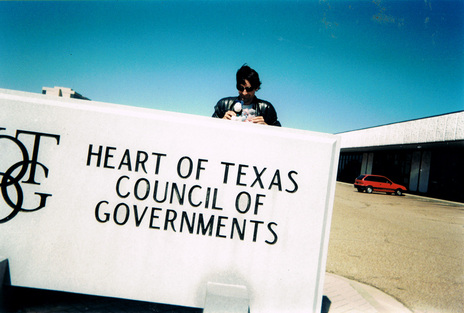
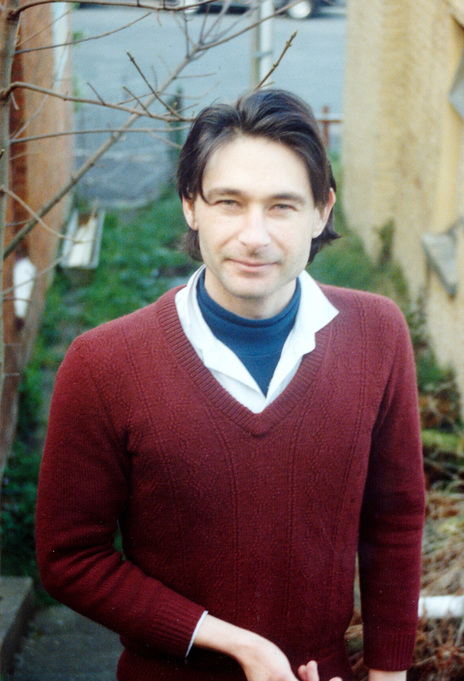
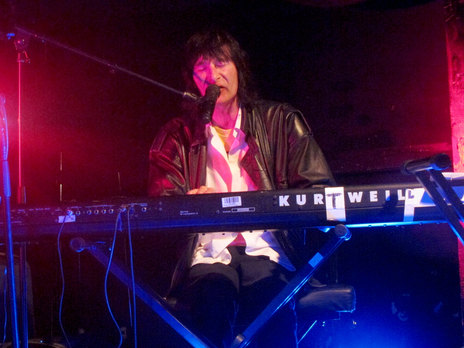
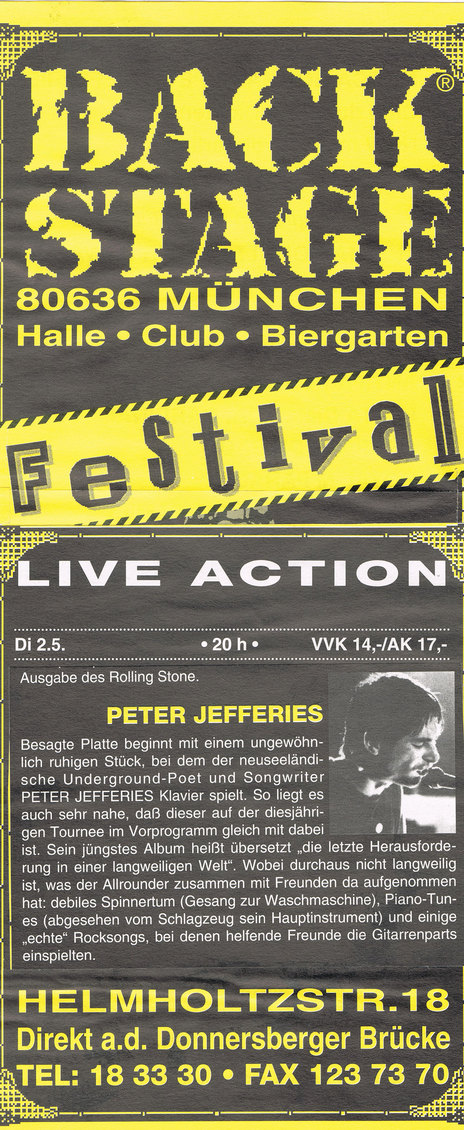
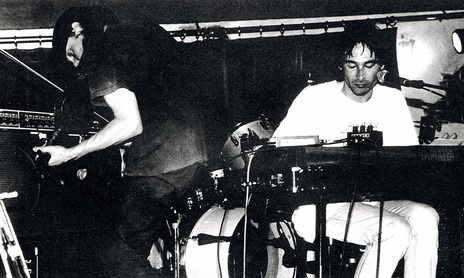
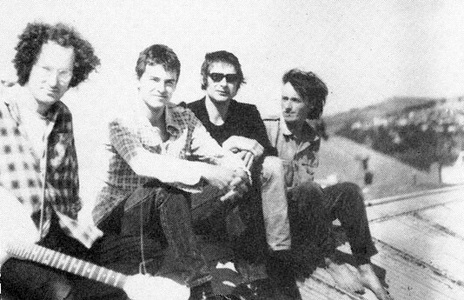
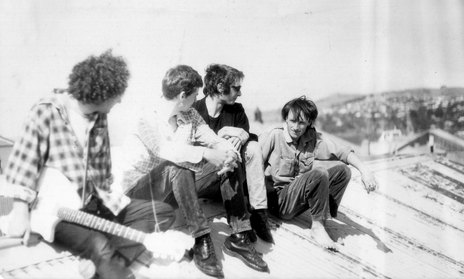
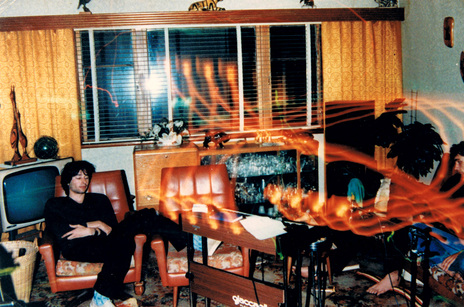
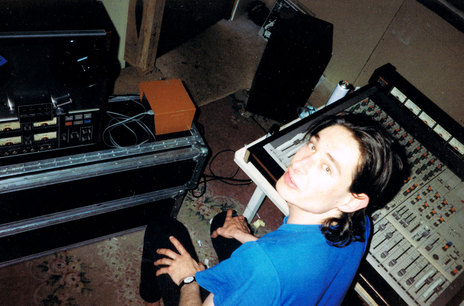
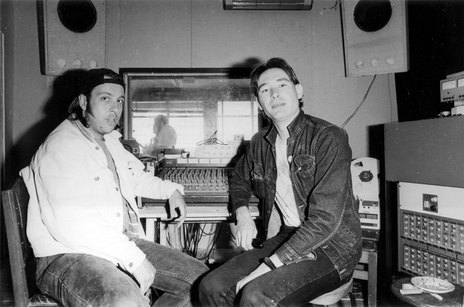
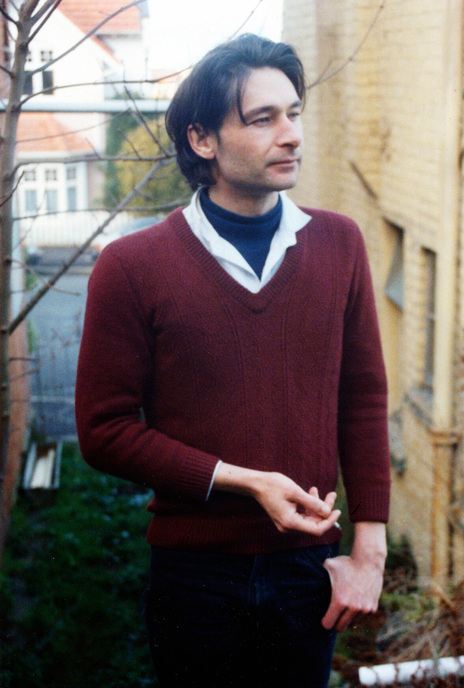
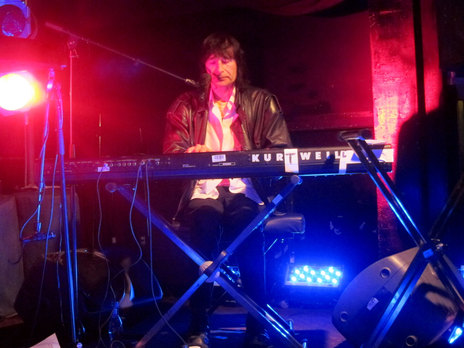
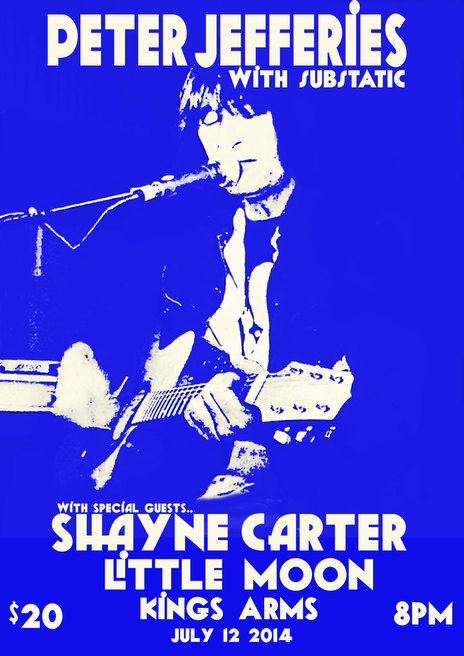
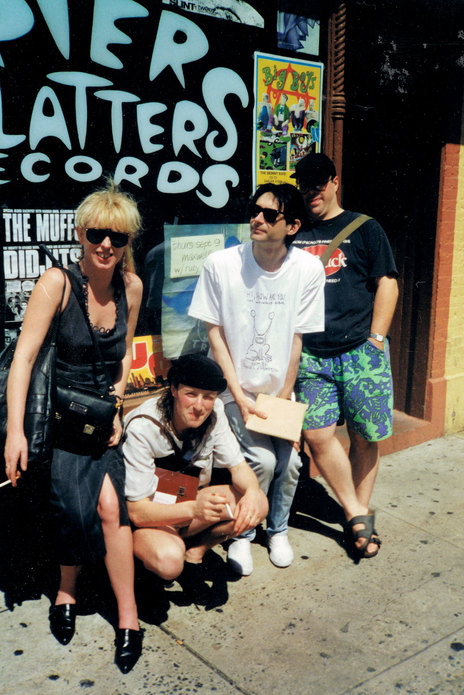
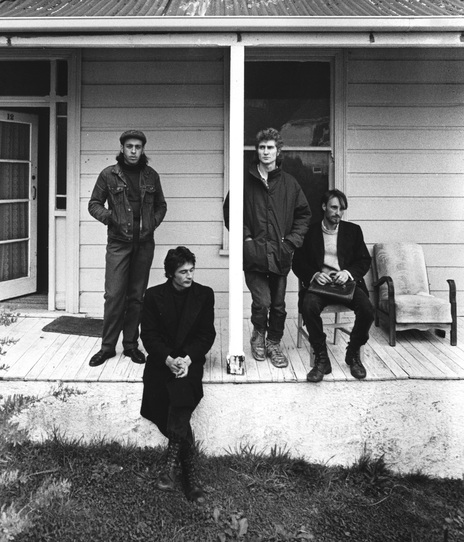
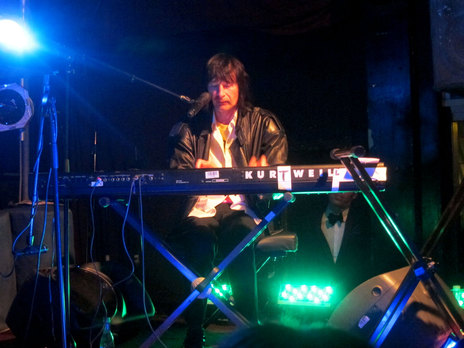
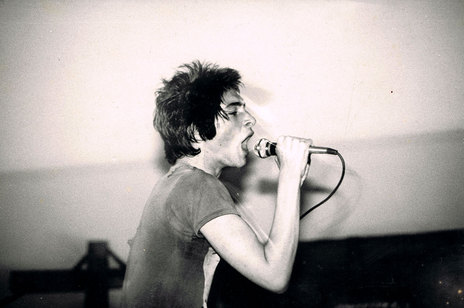
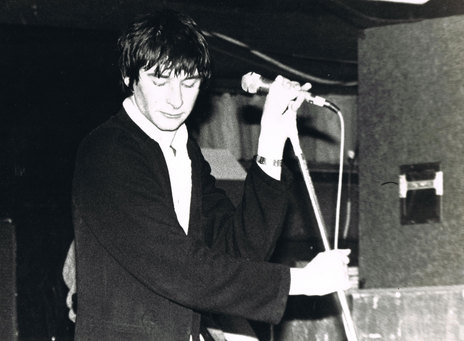
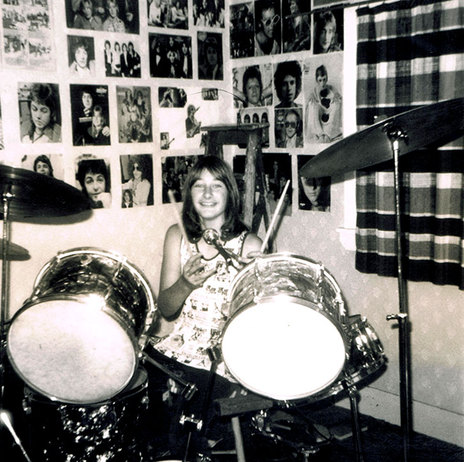
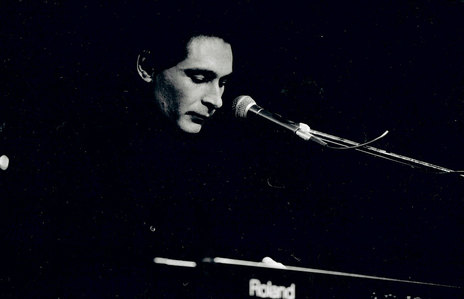
Visit our sister site
NZ On ScreenMade with funding from
NZ On Air




